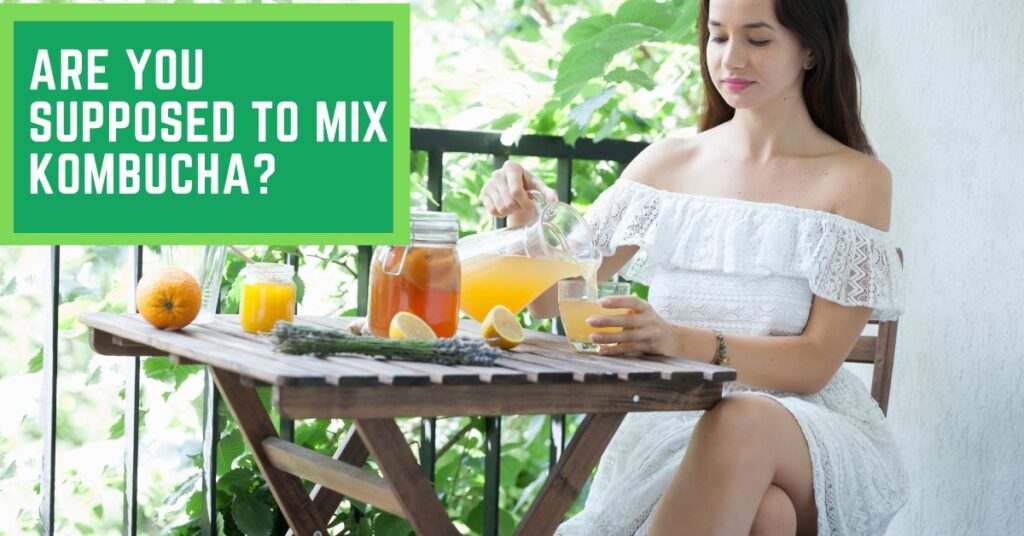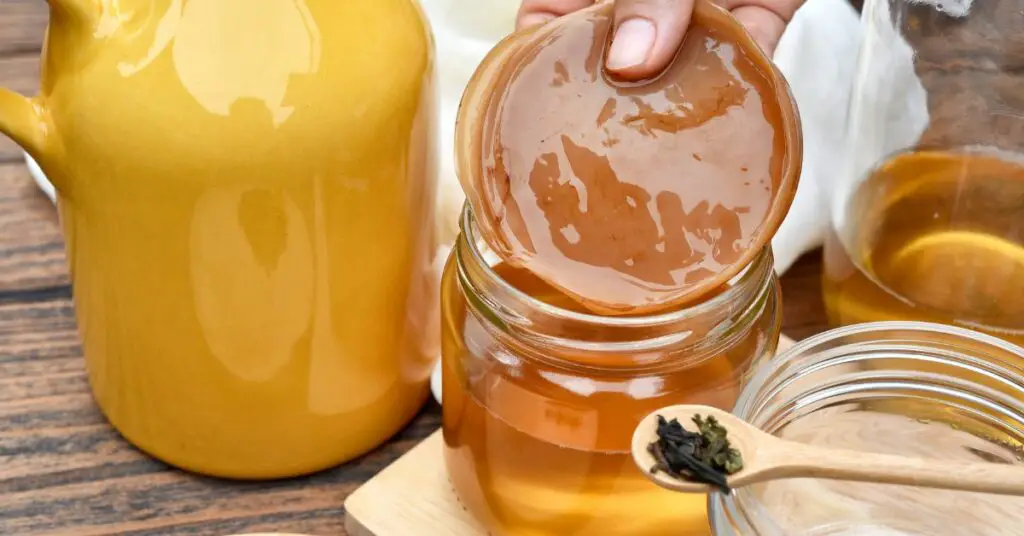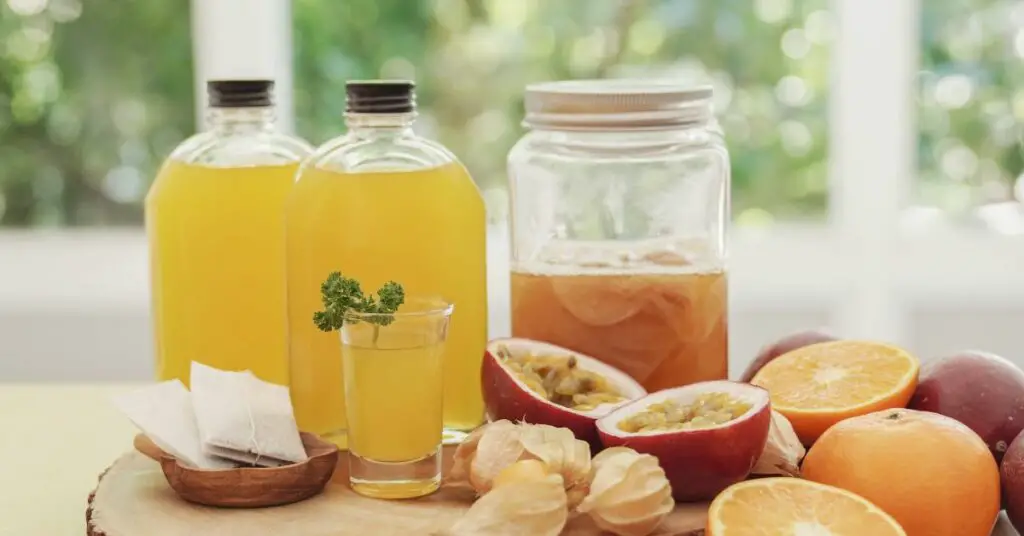Kombucha is a fermented tea that has been around for centuries.
It is made by adding a culture of bacteria and yeast to sweetened tea. This process creates a fizzy, slightly acidic beverage that is rich in probiotics.
Traditionally, kombucha was made with black tea, and you can mix up kombucha as per various other recipes.
In this article, you will learn more about kombucha and whether you are supposed to mix it.
What is Kombucha?
Kombucha is a fermented tea that has been around for centuries. It is made by adding a specific type of bacteria and yeast to black or green tea. This fermentation process creates a probiotic-rich beverage that is packed with health benefits.
Are you supposed to Mix kombucha With Other Drinks?
The short answer is no. Kombucha is best enjoyed on its own. Mixing it with other drinks can interfere with its probiotic benefits and make it less effective.
However, people used it as a mixer in cocktails. It can also be used in cooking to add a sour or tangy flavour to dishes.
If you do choose to mix kombucha with other drinks, be sure to do so in moderation. Too much of any one thing isn’t good for you, after all. And remember to drink kombucha responsibly – always listen to your body and never drink more than what feels comfortable for you.
Should You Add Fruit to Your Kombucha?
The answer to this question is a bit more complicated. Some people believe that adding fruit to kombucha can actually increase its health benefits. The logic is that the fruit will add more vitamins and minerals to the drink. And, since kombucha is already packed with probiotics, adding fruit will only make it better for you.
Others believe that fruit should be avoided because it can interfere with the fermentation process. This may cause the kombucha to become less effective or even go bad.
If you do decide to add fruit to your kombucha, be sure to do so in moderation. A little goes a long way, and too much fruit can actually make the drink taste bad. When in doubt, err on the side of caution and add less rather than more.
Can You Mix Different Types of Tea When Making Kombucha?
Yes, you can mix different types of tea when making kombucha. In fact, many people believe that this can actually enhance the flavour of the drink.
If you do choose to mix different types of tea, be sure to use high-quality black or green tea as your base. This will ensure that your kombucha is packed with probiotic benefits.
When it comes to flavouring your kombucha, feel free to get creative. Some popular combinations include Earl Grey and lavender, green and mint, or black and ginger. Experiment until you find a combination that you love.
Can You Mix Kombucha With Alcohol?
This is a controversial topic and one that is still being debated by experts.
However, most users believe that mixing kombucha with alcohol ruins its probiotic benefits. They argue that the alcohol kills the healthy bacteria in the drink, making it less effective.
If you do decide to mix kombucha with alcohol, be sure to do so in moderation. And remember to drink responsibly – always listen to your body and never drink more than what feels comfortable for you.
Should You Mix Different Flavors of Kombucha?
Kombucha is a fermented beverage made from sweetened tea. It’s become popular in recent years for its health benefits, which include aiding digestion and boosting immunity.
If you want to keep the probiotic benefits of kombucha, it’s best to stick to one flavour. However, if you’re looking for a tasty beverage, mixing flavors can be a great way to create new flavour combinations.
Here are a few things to keep in mind when mixing kombucha flavors:
1. Start with a small batch.
2. Choose complementary flavours.
3. Give it time to ferment.
How to Maintain The Uniqueness of Kombucha Drink?
Kombucha is a fermented beverage made from sweetened tea. It’s become popular in recent years for its health benefits, which include aiding digestion and boosting immunity.
To maintain the uniqueness of the kombucha drink, it’s important to keep it refrigerated and consume it within one week. You can also add fruit, herbs, or spices to flavour kombucha. For a probiotic-rich drink, look for kombucha that contains live cultures.
Kombucha is a refreshing and healthy beverage that’s easy to make at home. With a few simple tips, you can enjoy kombucha that tastes great and is good for you.
How to Use Kombucha in Cooking?
Kombucha can be used in a variety of recipes, from soups and stews to salad dressings and marinades. It’s also a great way to add flavour to otherwise bland dishes.
When using kombucha in cooking, it’s important to remember that it is a fermented beverage. This means that it contains live cultures, which can add a sour or tangy flavour to food. If you’re not a fan of this flavour, you can cook kombucha down until it’s no longer active.
Kombucha is also relatively high in acidity. This can be beneficial when used in marinades, as it can help to tenderize meat. However, it’s important to use kombucha sparingly, as too much can make food taste sour.
When cooking with kombucha, be sure to taste your food as you go. This will help you to adjust the kombucha accordingly and ensure that your dish is flavorful and delicious.
The Common Mistakes People Make When Making Kombucha
1. Not starting with a quality tea: When making kombucha, it’s important to start with a high-quality tea. This will give your kombucha the best flavour and health benefits. Some of the best teas to use are green tea, white tea, or black tea.
2. Using too much sugar: It’s important to use the right amount of sugar when making kombucha. Too much sugar can make your kombucha too sweet, while too little sugar can make it taste very unpleasant. The ideal ratio is 1/2 cup of sugar per gallon of tea.
3. Not using a SCOBY: A SCOBY (symbiotic culture of bacteria and yeast) is essential for making kombucha. This is what ferments the tea and gives kombucha its unique flavour and probiotic benefits. You can get a SCOBY from a friend or online.
4. Not fermenting long enough: Fermenting your kombucha for at least 2 weeks will give it the best flavour and health benefits. However, you can start drinking it sooner if you like. Just know that it will be less sour and have fewer probiotics the shorter you ferment it.
5. Not storing properly: It’s important to store your kombucha in a clean, airtight container. This will prevent it from getting contaminated and losing its flavor.
Be sure to remove the SCOBY before storing, and don’t forget to add some kombucha to the container to act as a starter for your next batch!
Frequently Asked Questions Related to Kombucha And Mixing Up Kombucha
1. How should you drink kombucha?
There are a lot of ways to drink kombucha, but the most popular way is to drink it straight. You can also add it to smoothies, juices, or tea. Some people even like to cook with it. Kombucha is a versatile drink that can be enjoyed any time of day.
2. How long does it take for kombucha to ferment?
Kombucha can ferment for anywhere from 7 to 30 days, depending on the temperature of its environment and the type of kombucha starter culture you’re using.
The warmer the temperature, the faster the fermentation process will be. If you’re using a continuous brewing system, your kombucha will be ready to drink in about 7 days.
If you’re using a SCOBY hotel, it may take up to 30 days for your kombucha to be fully fermented.






